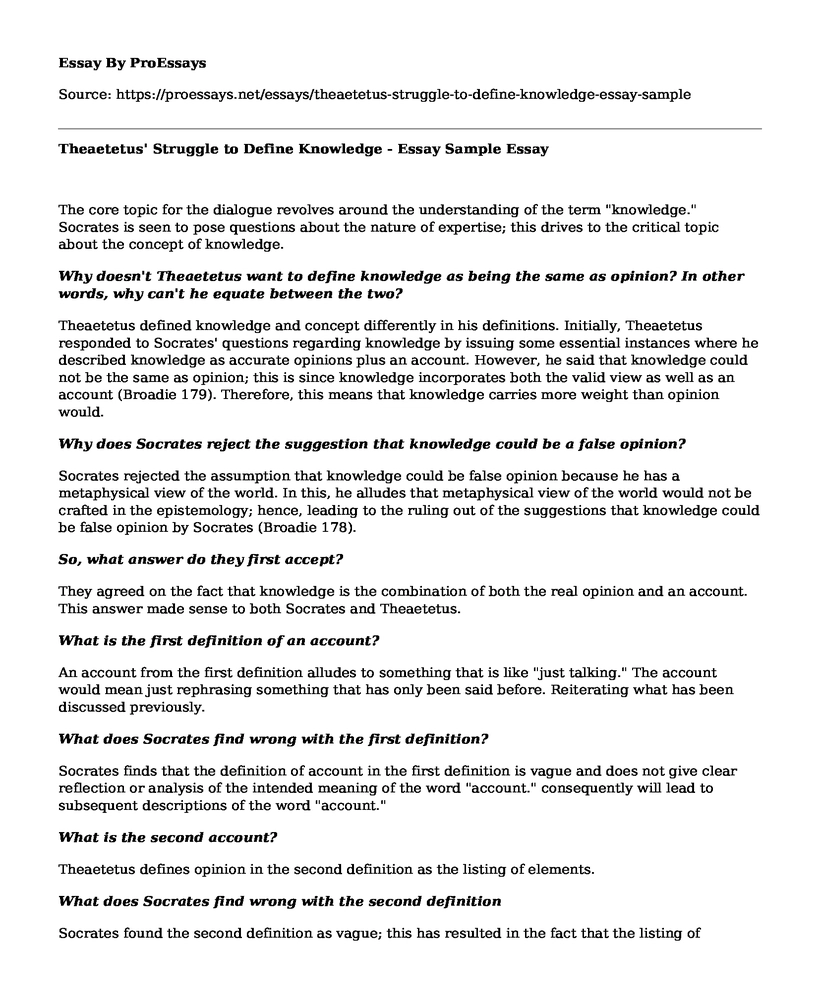The core topic for the dialogue revolves around the understanding of the term "knowledge." Socrates is seen to pose questions about the nature of expertise; this drives to the critical topic about the concept of knowledge.
Why doesn't Theaetetus want to define knowledge as being the same as opinion? In other words, why can't he equate between the two?
Theaetetus defined knowledge and concept differently in his definitions. Initially, Theaetetus responded to Socrates' questions regarding knowledge by issuing some essential instances where he described knowledge as accurate opinions plus an account. However, he said that knowledge could not be the same as opinion; this is since knowledge incorporates both the valid view as well as an account (Broadie 179). Therefore, this means that knowledge carries more weight than opinion would.
Why does Socrates reject the suggestion that knowledge could be a false opinion?
Socrates rejected the assumption that knowledge could be false opinion because he has a metaphysical view of the world. In this, he alludes that metaphysical view of the world would not be crafted in the epistemology; hence, leading to the ruling out of the suggestions that knowledge could be false opinion by Socrates (Broadie 178).
So, what answer do they first accept?
They agreed on the fact that knowledge is the combination of both the real opinion and an account. This answer made sense to both Socrates and Theaetetus.
What is the first definition of an account?
An account from the first definition alludes to something that is like "just talking." The account would mean just rephrasing something that has only been said before. Reiterating what has been discussed previously.
What does Socrates find wrong with the first definition?
Socrates finds that the definition of account in the first definition is vague and does not give clear reflection or analysis of the intended meaning of the word "account." consequently will lead to subsequent descriptions of the word "account."
What is the second account?
Theaetetus defines opinion in the second definition as the listing of elements.
What does Socrates find wrong with the second definition
Socrates found the second definition as vague; this has resulted in the fact that the listing of elements would not give critical satisfaction to the opinions provided and the knowledge concept.
What is the third definition?
The third definition of "account" infers to something that is like a distinguishing characteristic. The description is much improved and issues some promising analysis towards making the right opinions concerning the concept of knowledge.
What does Socrates find wrong with the third definition?
Despite the definition of knowledge been promising, Socrates finds some flaws in the description of the account. Socrates believes that statement cannot be a distinguishing characteristic due to the fact that one must possess all the features that differ from everyone else to conclude that the person approaching is the one in question (Broadie 178). Therefore, Socrates concludes that before one has the right opinion regarding something, they must know that particular thing or person.
Give a brief analysis of the answers Socrates gives. You need not go on at length about each definition, but you could go a bit in-depth on one of them.
Socrates gives clear accounts and arguments on the definitions of opinion. He believes that idea can neither be just a listing of elements nor a distinguishing characteristic of a given phenomenon. Socrates provides hefty analysis from which he proposes that knowledge must be fostered before having the aspect of opinion. For instance, he suggests that one must be willing to have all the experience that distinguishes a person from other individuals to give an outstanding opinion concerning that person.
Work Cited
Broadie, Sarah Jean. "The knowledge unacknowledged in the Theaetetus." Oxford Studies in Ancient Philosophy (2016).
Cite this page
Theaetetus' Struggle to Define Knowledge - Essay Sample. (2023, May 11). Retrieved from https://proessays.net/essays/theaetetus-struggle-to-define-knowledge-essay-sample
If you are the original author of this essay and no longer wish to have it published on the ProEssays website, please click below to request its removal:
- Letter From Ancestor About Life
- Australian Perception, Media Law and Ethics Paper Example
- Good Will as the Most Morally Valuable Thing Essay
- Socrates: Father of Western Philosophy & The Socratic Method - Essay Sample
- Paper Example on Living in the Cave: Plato's Views on Comfort & Fear
- Essay Example on God's Image: Christianity Enhances Society's Morality
- Ethics of Information Technology: Balancing Surveillance, Privacy, and Social Welfare - Paper Example







